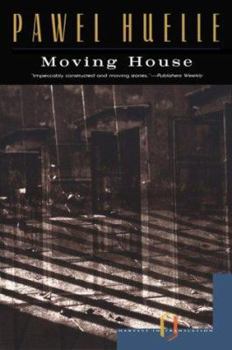Moving House: Stories
Select Format
Select Condition 
Book Overview
A collection of "intensely lyrical" stories set in postwar Poland. Mingling the miraculous and the mundane, these poignantly beautiful stories are quiet but powerful journeys of the spirit. Translated... This description may be from another edition of this product.
Format:Paperback
Language:English
ISBN:0156002515
ISBN13:9780156002516
Release Date:January 1996
Publisher:Mariner Books
Length:256 Pages
Weight:0.60 lbs.
Dimensions:0.7" x 5.3" x 8.0"
Customer Reviews
1 rating
Huelle projects the political onto the fantastic
Published by Thriftbooks.com User , 26 years ago
In Pawel Huelle's book of short stories, Moving House, the reader finds the Polish characters experiencing odd and often fantastic happenings in their lives in an often playful manner. However, when one examines Polish history in the 20th century, these strange incidents take on a new, often tragic, meaning. Huelle comes from a country where borders have shifted, and the land and people have been occupied by both their 'aggressor' (Germany) and their 'saviour' (Russia). In this dizzying political climate, those who were your friends one day would be enemies the next. Collective identity is more important than individual; therefore, a German or Russian becomes threatening, due to the history of occupation. Nothing is stable, or dependable in this situation; and Huelle has created a fine book of stories which reflect a Polish viewpoint of imaginative, fantastic literature.In the story "Table", a Polish family under Communism needs a new kitchen table. However, they cannot get a table like their old one, because that year, the Comrades building tables have decreed that tables must be triangular - which does not fit their room, or their settings. Seeking to find a woodworker who can (illegally) make them a proper table, they are at first successful, but run into problems, when the woodworker keeps delaying. He finally offers them a table - with the catch that it once belonged to a German officer. The main character's mother is furious, holding a deep-set hatred for the German people, and she wants no part of a table having belonged to one. This anger is not the only thing which comes with this furniture; the main character starts seeing a German ghost in the house. The story shows a family grappling with the very real effects of a Communist system and the memories of a Nazi occupation, all through a single piece of furniture.A disappearing village is the mystery of "Uncle Heinrich," a story in which the main character and his Uncle go on a skiing trip and lose their way. Uncle Heinrich is an adventuresome man,given to encouraging his young nephew to forsake books and explore nature at its most rugged. On their excursion, they not only lose their way, but lose the map which has been guiding them. They come across a village where they find food and shelter until the storm is gone. The kindly villagers reveal some eccentric customs when Uncle Heinrich and nephew are called upon to act as outside judges to a town election, leaving them both with a threatened feeling. Years later, Uncle Heinrich writes his nephew, detailing his efforts to again find that village - but cannot, and cannot find any map with reference to the place. This story draws a correlation to the Baltic country of Lithuania, part of Poland before World War II, and made part of the USSR when borders were redrawn after the war. When one looks at the maps chronicling Poland's border shifts, one can see how entire areas seem to "disappear" into the USS





